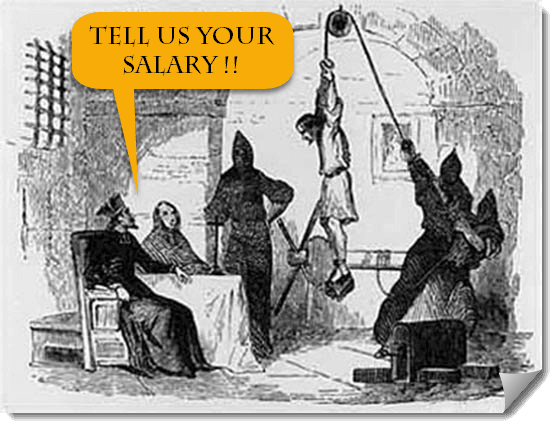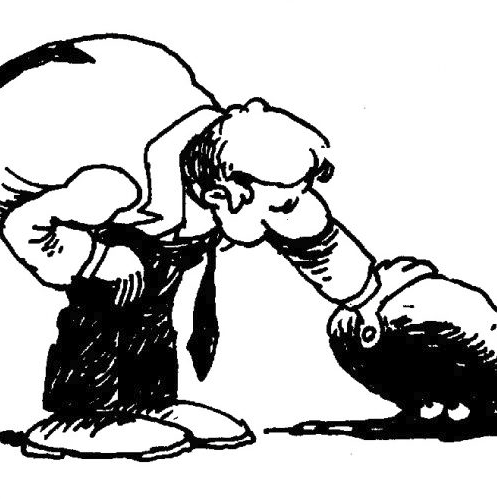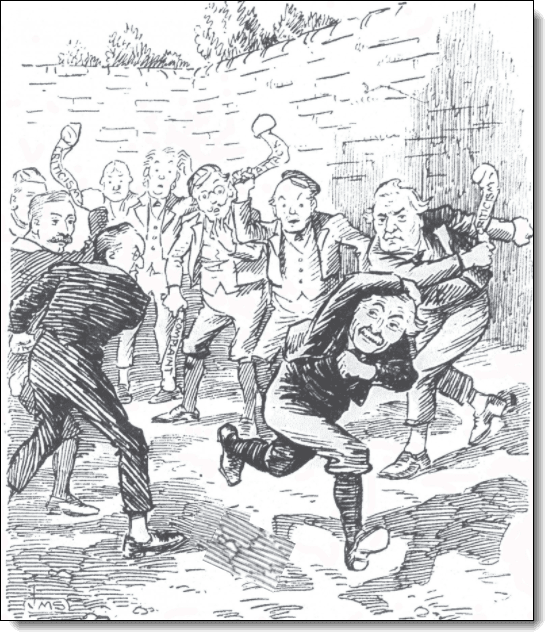In the April 24, 2018 Ask The Headhunter Newsletter, a reader cites the law about employers demanding job applicants’ salary history.
Question
The job application I had to fill out required I provide my current salary info. I just read that a U.S. Circuit Court of Appeals decided that employers can’t use my old salary to decide my job offer, so why do they keep asking? (Court Ruling: There’s Never a Reason to Use Salary History When Calculating Pay.) I’ve started asking HR why they need that information and, Man, have I heard some real doozies. Seriously, HR thinks we believe that stuff? You and your readers have probably heard bigger whoppers than I have — can you share a few?
Nick’s Reply
 Thanks for asking. My purpose behind this week’s column is revealed in the title. When we get to the end of it, I’m going to ask everyone to complete that sentence: “We need to know your salary because — .”
Thanks for asking. My purpose behind this week’s column is revealed in the title. When we get to the end of it, I’m going to ask everyone to complete that sentence: “We need to know your salary because — .”
But first, please bear with me while we briefly discuss that new court decision.
What’s the value?
I’ve been warning job seekers not to disclose their salary to employers since I before I started writing Ask The Headhunter, because I’ve routinely refused to tell my clients (employers) how much money my job candidates were making. (See Keep Your Salary Under Wraps.)
“I will help you assess what the candidate is actually worth to your company so that you can make a competitive job offer,” is my counter-offer to the employer’s demand for salary history information.
I’ll admit, I’ve lost a few clients over this, but I also fired a few over it. Most employers realize it’s a healthy exercise to figure out a particular job candidate’s value independent of what any other company paid them.
If they’re not willing or able to figure this out for themselves, then I think they’re not worth working with (or for) because relying on some other employer’s judgement of a worker is both stupid and a revelation that a company has no competitive edge on judging value.
You can just say NO to demands for salary information
I’ll never forget the guy who called to thank me for his 75% salary increase when he landed a new job with one of my clients: “You just helped me buy my first house!” His old salary was $44,000. The job offer he accepted was for $77,000. “Thanks for instructing me not to disclose my current salary even when they insisted, because they backed off!”
While not all HR departments will back off if you politely but firmly decline to disclose (“My salary information is private and confidential.”), readers report that HR usually lets it go and proceeds with the job interview. You must judge for yourself how to respond, but you must also realize that if you do disclose, you’ve probably destroyed your ability to negotiate the best job offer. An employer may have the right to ask for your salary, and it may be legally free to terminate your application, but you also have the right to say NO.
Gender-mandering the salary issue
The article you refer to was written by my good buddy Suzanne Lucas (a.k.a. The Evil HR Lady), and she correctly points out that while the issue in Rizo v. Yovino was gender pay disparity, the decision is not about the gender issue per se. While the gender pay gap is a big concern to me (see Don’t blame women for the gender pay gap!), for now (just for now) I’ll leave that angle to Suzanne.
My bigger concern is that in the battle over equal pay for women the courts keep missing the fact that once an employer learns anyone’s salary history, everyone gets screwed when job offers are issued. Knowing your old salary enables an employer to easily cap your new job offer. That’s actually the defense offered by the Fresno County Schools: They freely admit that they’ve stuck it to more than 3,000 employees over 17 years — men and women — it’s the policy!
[Fresno County Schools attorney Michael] Woods said in an email Monday, “FCSS’ policy, applied to more than 3,000 employees over 17 years, was similar to policies used by many other employers…”
– Fresno Bee
While some employers don’t play that game, in my experience most do. It’s never smart to disclose your salary. (See Should I disclose my salary history? and Salary History: Can you afford to say NO?)
The Court issues a general rule about prior salary
Certainly, any legal win that protects women’s right to equal pay is a good thing. But now the 9th Circuit Court of Appeals has finally articulated the law in broader terms that seem to apply to everyone (emphasis added):
It doesn’t say “between genders.” This interpretation of the Equal Pay Act, a federal law passed more than 50 years ago, seems to prohibit any general use of anyone’s salary history to determine a job offer. Maybe I’m reading this too broadly, but I expect the debate has just begun.
HR’s salary game
Now let’s get to the purpose of this article: to discuss the games HR departments play regarding your salary history.
“We need to know your salary because…”
You’ve been there. You’ve applied for a job. Maybe HR called or e-mailed you and asked for your current (or most recent, if you’re unemployed) salary. Maybe you didn’t fill in that box on the job application form, and HR called to reprimand you.
You’ve heard the lines:
- “We need to know your salary because… without it, we cannot continue to process your application.”
- “We need to know your salary because… it’s the policy.”
- “We need to know your salary because… we need to know whether you’re in our salary range.”
- “Just tell us, because we SAID SO!”
What excuses have you heard?
The explanations for why HR “needs to know” your personal, private, confidential salary information are legion. But in all my years in business, I’ve never heard one good justification for why an employer needs to know how much money you make so it can consider you for a job.
The “reasons” are all so disingenuous and such tautologies that I have a standing challenge to all who work in HR: Give me one sound reason why you need to know how much anybody makes?
I’d like us to compile as extensive a list as we can.
What excuses for this salary demand have you heard? Let’s rack ’em up, expose them, look at them closely and discuss what it all means.
I’d also like to know what responses you’ve offered to HR — whether serious or snarky!
: :



 In a recent column,
In a recent column,  I’ve read your many columns about how to negotiate salary, how much to ask for when applying for a new job, what not to say about my salary history, and about why salary surveys (and websites) aren’t to be relied on. Now I’m doing some introspecting, trying to look at the big picture of my value and what I’m worth in the world. I wish I had started thinking about this 15 years ago.
I’ve read your many columns about how to negotiate salary, how much to ask for when applying for a new job, what not to say about my salary history, and about why salary surveys (and websites) aren’t to be relied on. Now I’m doing some introspecting, trying to look at the big picture of my value and what I’m worth in the world. I wish I had started thinking about this 15 years ago. One of the last questions I ask during job interviews is where they are in their hiring process. I have read that one should try to be the last applicant interviewed in the process. But in the majority of my interviews, I have been the first candidate, therefore setting the bar.
One of the last questions I ask during job interviews is where they are in their hiring process. I have read that one should try to be the last applicant interviewed in the process. But in the majority of my interviews, I have been the first candidate, therefore setting the bar. I applied for a job not too far from me. I was invited in for an interview. I went to the interview and did not hear back for two weeks. I e-mailed my potential boss to follow up and he responded by telling me something to the effect of, “I’m so sorry, I was just about to contact you and invite you in for a second interview!” So I went to the second interview and at the conclusion he said that I was one of the two last candidates and he would let me know in a week what his decision is.
I applied for a job not too far from me. I was invited in for an interview. I went to the interview and did not hear back for two weeks. I e-mailed my potential boss to follow up and he responded by telling me something to the effect of, “I’m so sorry, I was just about to contact you and invite you in for a second interview!” So I went to the second interview and at the conclusion he said that I was one of the two last candidates and he would let me know in a week what his decision is. A friend at a company I’m interested in working for referred me for a job. I have a phone interview scheduled with a “technical recruiter” later today. I asked if there was any special preparation I could do for the interview. I was told no, that we would be covering my previous experience and projects during the call.
A friend at a company I’m interested in working for referred me for a job. I have a phone interview scheduled with a “technical recruiter” later today. I asked if there was any special preparation I could do for the interview. I was told no, that we would be covering my previous experience and projects during the call. I’ve been in Human Resources 12 years and I have to say your article
I’ve been in Human Resources 12 years and I have to say your article  My suggestion to most businesses is that they can relieve their HR departments of recruiting, candidate selection and hiring functions without any significant loss. The HR function is Human Resources, not Human Recruiting. (See
My suggestion to most businesses is that they can relieve their HR departments of recruiting, candidate selection and hiring functions without any significant loss. The HR function is Human Resources, not Human Recruiting. (See 